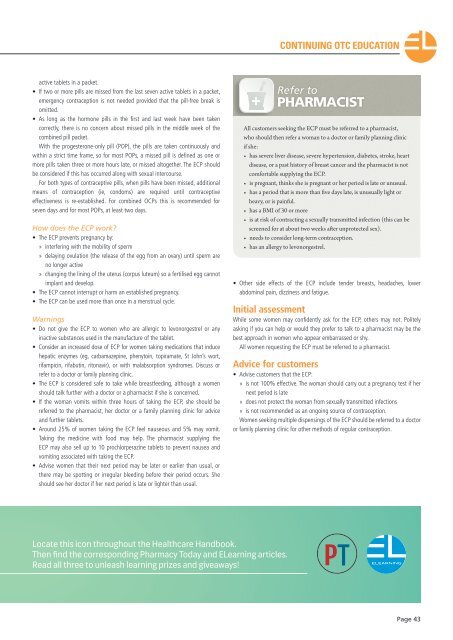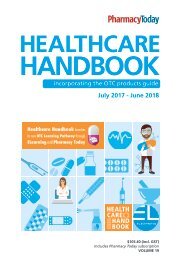2017 HCHB_digital
You also want an ePaper? Increase the reach of your titles
YUMPU automatically turns print PDFs into web optimized ePapers that Google loves.
CONTINUING OTC EDUCATION<br />
active tablets in a packet.<br />
• If two or more pills are missed from the last seven active tablets in a packet,<br />
emergency contraception is not needed provided that the pill-free break is<br />
omitted.<br />
• As long as the hormone pills in the first and last week have been taken<br />
correctly, there is no concern about missed pills in the middle week of the<br />
combined pill packet.<br />
With the progesterone-only pill (POP), the pills are taken continuously and<br />
within a strict time frame, so for most POPs, a missed pill is defined as one or<br />
more pills taken three or more hours late, or missed altogether. The ECP should<br />
be considered if this has occurred along with sexual intercourse.<br />
For both types of contraceptive pills, when pills have been missed, additional<br />
means of contraception (ie, condoms) are required until contraceptive<br />
effectiveness is re-established. For combined OCPs this is recommended for<br />
seven days and for most POPs, at least two days.<br />
How does the ECP work?<br />
• The ECP prevents pregnancy by:<br />
»»<br />
interfering with the mobility of sperm<br />
»»<br />
delaying ovulation (the release of the egg from an ovary) until sperm are<br />
no longer active<br />
»»<br />
changing the lining of the uterus (corpus luteum) so a fertilised egg cannot<br />
implant and develop.<br />
• The ECP cannot interrupt or harm an established pregnancy.<br />
• The ECP can be used more than once in a menstrual cycle.<br />
Warnings<br />
• Do not give the ECP to women who are allergic to levonorgestrel or any<br />
inactive substances used in the manufacture of the tablet.<br />
• Consider an increased dose of ECP for women taking medications that induce<br />
hepatic enzymes (eg, carbamazepine, phenytoin, topiramate, St John’s wort,<br />
rifampicin, rifabutin, ritonavir), or with malabsorption syndromes. Discuss or<br />
refer to a doctor or family planning clinic.<br />
• The ECP is considered safe to take while breastfeeding, although a women<br />
should talk further with a doctor or a pharmacist if she is concerned.<br />
• If the woman vomits within three hours of taking the ECP, she should be<br />
referred to the pharmacist, her doctor or a family planning clinic for advice<br />
and further tablets.<br />
• Around 25% of women taking the ECP feel nauseous and 5% may vomit.<br />
Taking the medicine with food may help. The pharmacist supplying the<br />
ECP may also sell up to 10 prochlorperazine tablets to prevent nausea and<br />
vomiting associated with taking the ECP.<br />
• Advise women that their next period may be later or earlier than usual, or<br />
there may be spotting or irregular bleeding before their period occurs. She<br />
should see her doctor if her next period is late or lighter than usual.<br />
Refer to<br />
PHARMACIST<br />
All customers seeking the ECP must be referred to a pharmacist,<br />
who should then refer a woman to a doctor or family planning clinic<br />
if she:<br />
• has severe liver disease, severe hypertension, diabetes, stroke, heart<br />
disease, or a past history of breast cancer and the pharmacist is not<br />
comfortable supplying the ECP.<br />
• is pregnant, thinks she is pregnant or her period is late or unusual.<br />
• has a period that is more than five days late, is unusually light or<br />
heavy, or is painful.<br />
• has a BMI of 30 or more<br />
• is at risk of contracting a sexually transmitted infection (this can be<br />
screened for at about two weeks after unprotected sex).<br />
• needs to consider long-term contraception.<br />
• has an allergy to levonorgestrel.<br />
• Other side effects of the ECP include tender breasts, headaches, lower<br />
abdominal pain, dizziness and fatigue.<br />
Initial assessment<br />
While some women may confidently ask for the ECP, others may not. Politely<br />
asking if you can help or would they prefer to talk to a pharmacist may be the<br />
best approach in women who appear embarrassed or shy.<br />
All women requesting the ECP must be referred to a pharmacist.<br />
Advice for customers<br />
• Advise customers that the ECP:<br />
»»<br />
is not 100% effective. The woman should carry out a pregnancy test if her<br />
next period is late<br />
»»<br />
does not protect the woman from sexually transmitted infections<br />
»»<br />
is not recommended as an ongoing source of contraception.<br />
Women seeking multiple dispensings of the ECP should be referred to a doctor<br />
or family planning clinic for other methods of regular contraception.<br />
Locate this icon throughout the Healthcare Handbook.<br />
Then find the corresponding Pharmacy Today and ELearning articles.<br />
Read all three to unleash learning prizes and giveaways!<br />
Page 43



